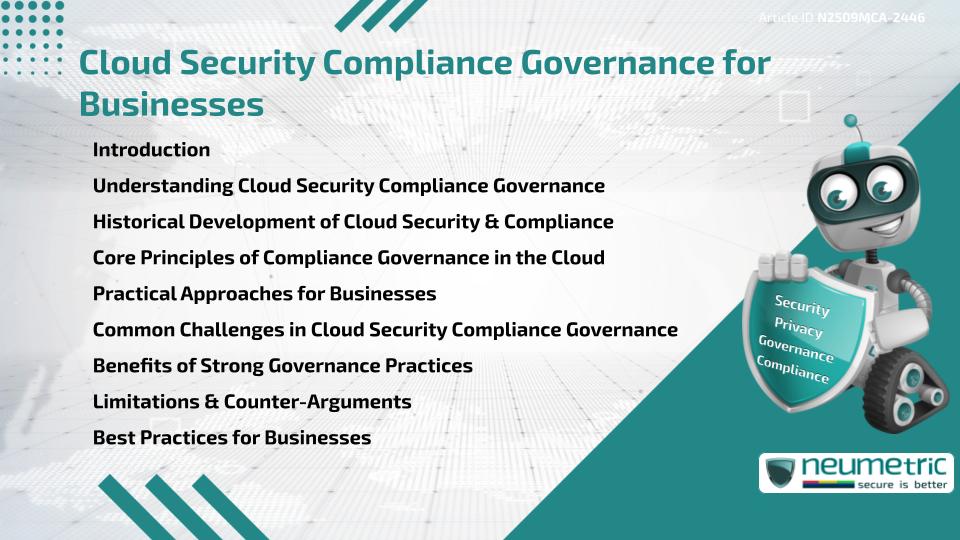Table of Contents
ToggleIntroduction
Cloud Security Compliance Governance is the Framework businesses use to align their Cloud operations with Regulatory requirements, Industry Standards & internal Security Policies. It ensures that Sensitive Data stored or processed in the Cloud remains protected, while helping organisations avoid Regulatory penalties & Reputational damage.
This article explains the meaning, history, challenges, benefits & Best Practices of Cloud Security Compliance Governance. It highlights why businesses cannot treat Governance as optional in today’s digital-first environment.
Understanding Cloud Security Compliance Governance
At its core, Cloud Security Compliance Governance ensures that businesses not only meet external Regulatory obligations but also maintain consistency in their internal Security Measures. It defines Accountability, enforces Monitoring & provides clear guidance for how data & systems should be managed in the Cloud.
A useful analogy is air traffic control. Just as every plane must follow precise rules to avoid collisions, businesses in the Cloud must follow Governance frameworks to ensure their operations remain secure & compliant.
Historical Development of Cloud Security & Compliance
Cloud computing took shape in the early 2000s as businesses sought flexible & scalable solutions. Initially, security concerns limited widespread adoption. Over time, Compliance Requirements such as HIPAA in Healthcare or PCI DSS in Finance demanded stronger oversight of Cloud services.
By the 2010s, Cloud providers began offering built-in Compliance tools, while governments introduced strict Data Protection regulations like the General Data Protection Regulation [GDPR]. Today, Cloud Security Compliance Governance is a central focus for businesses of all sizes.
Core Principles of Compliance Governance in the Cloud
For Cloud Security Compliance Governance to be effective, businesses should adhere to these principles:
- Clarity in Policies: Policies must address Cloud-specific Risks & Responsibilities.
- Shared Responsibility: Both the Cloud provider & the Customer must clearly understand their roles.
- Continuous Monitoring: Real-time tracking of Compliance helps identify Risks early.
- Transparency: Documented processes ensure Accountability & Audit readiness.
- Adaptability: Governance structures must evolve with changing regulations & technologies.
Practical Approaches for Businesses
Businesses can adopt several approaches to strengthen Governance in Cloud environments:
- Conducting regular Compliance Audits.
- Leveraging automated Compliance Monitoring Tools.
- Training staff on Cloud-specific Compliance practices.
- Using Encryption, Access Controls & Logging to reinforce technical security.
- Collaborating with Cloud providers to align on shared responsibilities.
Practical Governance requires blending technology, processes & human awareness, ensuring that no single element is overlooked.
Common Challenges in Cloud Security Compliance Governance
Despite its importance, Cloud Security Compliance Governance is not without challenges. Key issues include:
- The complexity of multiple overlapping regulations across regions.
- Limited visibility into Third Party Cloud providers’ operations.
- Resource constraints, particularly for small & medium-sized businesses.
- Employee resistance to adopting new Compliance processes.
These challenges highlight the need for businesses to approach Governance as an ongoing commitment rather than a one-time setup.
Benefits of Strong Governance Practices
When businesses implement effective Cloud Security Compliance Governance, the advantages are significant:
- Risk Reduction: Lower chances of Breaches & Financial losses.
- Regulatory Protection: Avoidance of penalties & fines.
- Customer Confidence: Enhanced Trust & Credibility with Clients.
- Operational Efficiency: Streamlined processes reduce duplication & errors.
Limitations & Counter-Arguments
Some argue that Cloud Security Compliance Governance may slow down innovation by introducing too many checks & approvals. Others point out that Compliance does not always equal full security, as Threats evolve faster than regulations.
While these limitations are valid, they reinforce the need for businesses to treat Governance as both a Compliance & a Security initiative.
Best Practices for Businesses
To achieve stronger Cloud Security Compliance Governance, businesses should:
- Stay updated on Regulatory changes.
- Integrate Governance into day-to-day operations.
- Conduct Risk Assessments at regular intervals.
- Establish clear communication with Cloud Service Providers.
- Encourage a culture of Compliance among Employees.
Takeaways
- Cloud Security Compliance Governance ensures businesses stay secure & aligned with regulations.
- Strong Governance reduces Risks & builds Customer Trust.
- Businesses face challenges but can overcome them with proactive measures.
- Governance should balance Regulatory Compliance with innovation.
- Best Practices transform Governance into a strategic advantage.
FAQ
What is Cloud Security Compliance Governance?
It is the Framework businesses use to manage Cloud Security while ensuring Compliance with regulations & standards.
Why is Governance important in Cloud Compliance?
It ensures Accountability, reduces Risks, protects Customer Data & helps businesses avoid Legal or Regulatory penalties.
What challenges do businesses face with Cloud Governance?
Challenges include complex regulations, lack of visibility into Cloud providers, limited resources & Employee resistance.
Does Compliance guarantee full security in the Cloud?
No, Compliance sets minimum requirements. Businesses must adopt additional security practices to achieve stronger protection.
How can Small Businesses manage Cloud Compliance?
They can use scalable Compliance tools, adopt clear Policies & partner with Providers that offer built-in Governance features.
What role do Employees play in Governance?
Employees contribute by following Policies, attending Training sessions & maintaining a culture of Accountability.
How is Governance different from Compliance?
Governance defines the structure & oversight, while Compliance ensures that specific requirements are being met.
Need help for Security, Privacy, Governance & VAPT?
Neumetric provides organisations the necessary help to achieve their Cybersecurity, Compliance, Governance, Privacy, Certifications & Pentesting needs.
Organisations & Businesses, specifically those which provide SaaS & AI Solutions in the Fintech, BFSI & other regulated sectors, usually need a Cybersecurity Partner for meeting & maintaining the ongoing Security & Privacy needs & requirements of their Enterprise Clients & Privacy conscious Customers.
SOC 2, ISO 27001, ISO 42001, NIST, HIPAA, HECVAT, EU GDPR are some of the Frameworks that are served by Fusion – a SaaS, multimodular, multitenant, centralised, automated, Cybersecurity & Compliance Management system.
Neumetric also provides Expert Services for technical security which covers VAPT for Web Applications, APIs, iOS & Android Mobile Apps, Security Testing for AWS & other Cloud Environments & Cloud Infrastructure & other similar scopes.
Reach out to us by Email or filling out the Contact Form…


